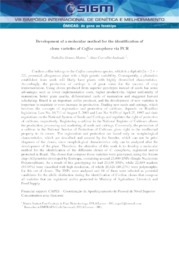Development of a molecular method for the identification of clone varieties of Coffea canephora via PCR.
Development of a molecular method for the identification of clone varieties of Coffea canephora via PCR.
Author(s): MATTOS, N. G.; ANDRADE, A. C.
Summary: Conilon coffee belongs to the Coffea canephora species, which is a diploid (2n = 2 × = 22), perennial, allogamous plant with a high genetic variability. Consequently, a plantation established from seeds will likely have plants with highly diversified characteristics. Accordingly, the production of cuttings is of great value for the success of crop implementation. Using clones produced from superior genotypes instead of seeds has some advantages such as lower implementation costs, higher productivity, higher uniformity of maturation, better grain quality, differentiated cycle of maturation and staggered harvest scheduling. Brazil is an important coffee producer, and the development of new varieties is important to maintain or even increase its production.
Publication year: 2017
Types of publication: Abstract in annals or event proceedings
Unit: Embrapa Coffee
Observation
Some of Embrapa's publications are published as ePub files. To read them, use or download one of the following free software options to your computer or mobile device. Android: Google Play Books; IOS: iBooks; Windows and Linux: Calibre.
Access other publications
Access the Agricultural Research Database (BDPA) to consult Embrapa's full library collection and records.
Visit Embrapa Bookstore to purchase books and other publications sold by Embrapa.

